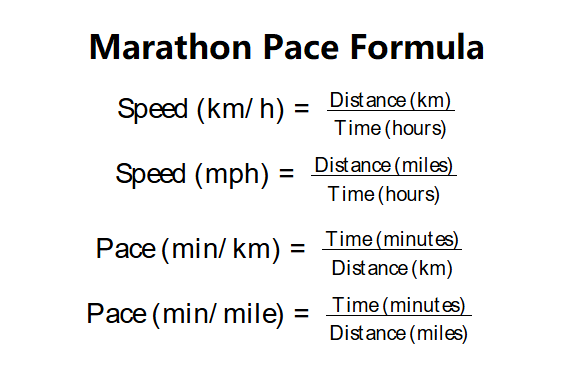1. What is a Marathon Pace Calculator?
Definition: This calculator determines your running speed and pace for a selected race distance based on your finish time.
Purpose: It helps runners plan their races by estimating how fast they need to run to achieve a target time, or to analyze their performance after a race.
2. How Does the Calculator Work?
The calculator computes speed and pace using the following formulas:
Speed:
\( \text{Speed (km/h)} = \frac{\text{Distance (km)}}{\text{Time (hours)}} \)
\( \text{Speed (mph)} = \frac{\text{Distance (miles)}}{\text{Time (hours)}} \)
\( \text{Speed (m/s)} = \frac{\text{Distance (meters)}}{\text{Time (seconds)}} \)
\( \text{Speed (ft/s)} = \frac{\text{Distance (feet)}}{\text{Time (seconds)}} \)
Pace:
\( \text{Pace (min/km)} = \frac{\text{Time (minutes)}}{\text{Distance (km)}} \)
\( \text{Pace (min/mile)} = \frac{\text{Time (minutes)}}{\text{Distance (miles)}} \)
Steps:
- Select the race Distance from the dropdown.
- Enter your finish time in hours, minutes, and seconds.
- Select the Speed Unit (km/h, mph, m/s, ft/s).
- Validate that the time is positive.
- Compute Speed by dividing distance by time, in the selected unit.
- Compute Pace in min/km and min/mile.
- Display Speed and Pace values.
3. Importance of Pace and Speed Calculations
These calculations are crucial for:
- Race Strategy: Helps runners set a target pace to meet their goal time.
- Performance Analysis: Allows runners to evaluate their speed and pace after a race.
- Training Planning: Provides insights for setting pace goals during training runs.
4. Using the Calculator
Example 1: A runner finishes a Half-Marathon in 1 hour 35 minutes, speed in km/h:
- Distance: Half-Marathon (21.0975 km)
- Time: 1 hr 35 min = 5700 seconds
- Speed (km/h): \( \frac{21.0975}{5700 / 3600} \approx 13.33 \, \text{km/h} \)
- Pace (min/km): \( \frac{95}{21.0975} \approx 4.50 \, \text{min/km} = 4 \, \text{min} \, 30 \, \text{sec per km} \)
- Pace (min/mile): \( \frac{95}{13.1094} \approx 7.25 \, \text{min/mile} = 7 \, \text{min} \, 15 \, \text{sec per mile} \)
Example 2: A runner finishes a 10K in 50 minutes, speed in mph:
- Distance: 10K (6.21371 miles)
- Time: 50 min = 3000 seconds
- Speed (mph): \( \frac{6.21371}{3000 / 3600} \approx 7.46 \, \text{mph} \)
- Pace (min/km): \( \frac{50}{10} = 5.00 \, \text{min/km} = 5 \, \text{min} \, 0 \, \text{sec per km} \)
- Pace (min/mile): \( \frac{50}{6.21371} \approx 8.05 \, \text{min/mile} \approx 8 \, \text{min} \, 3 \, \text{sec per mile} \)
5. Frequently Asked Questions (FAQ)
Q: What is the difference between pace and speed?
A: Pace is time per distance (e.g., min/km), while speed is distance per time (e.g., km/h). Pace helps runners plan their effort, while speed shows how fast they are moving.
Q: Why does pace vary with distance?
A: Longer distances typically result in a slower pace because maintaining a high speed becomes harder over time due to fatigue.
Q: How accurate are these calculations?
A: They are precise for the given inputs but assume a constant pace. Real-world factors like terrain, weather, and fatigue can affect actual performance.
Marathon Pace Calculator© - All Rights Reserved 2025
 Home
Home
 Back
Back
